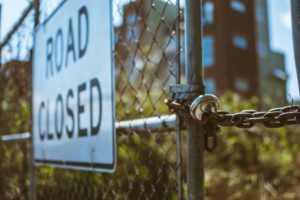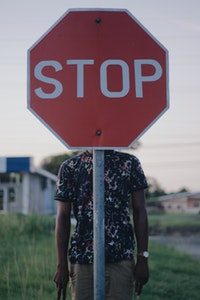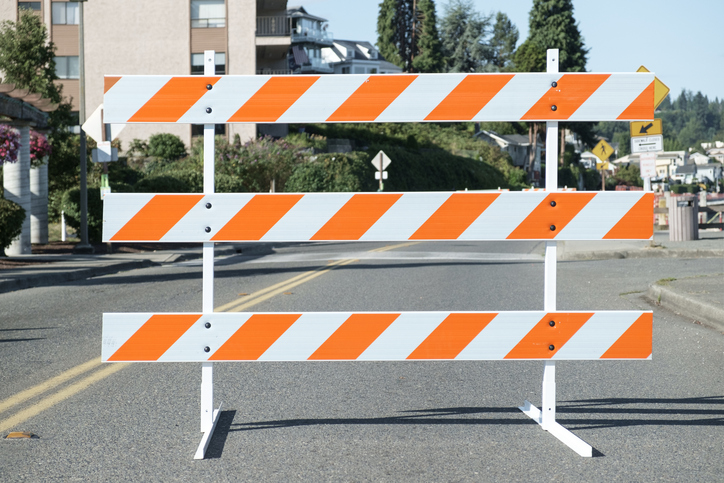When God Sends a Roadblock
 Have you ever been cruising on the highway – and then BAM! Out of nowhere, you hit a roadblock. Everything was smooth sailing, rocking to your favorite song. You were on schedule to reach your destination on time, now your GPS is covered in red flags. It’s a pain.
Have you ever been cruising on the highway – and then BAM! Out of nowhere, you hit a roadblock. Everything was smooth sailing, rocking to your favorite song. You were on schedule to reach your destination on time, now your GPS is covered in red flags. It’s a pain.
And, it’s no less frustrating in life when we’re trying to reach our goals, doing our best to live on purpose and we hit a roadblock while following the path God has set before us.
See, one of the most frustrating things about a roadblock that happens when you’re doing the right thing is – you’ve hit a roadblock while doing the right thing! It’s easier for us to understand a roadblock when we know we’ve veered off the right path.
But, how many of us are irritated right now because we’re obeying God’s word, doing what we’re supposed to do in the right spirit, and no matter how we try – that thing just won’t work?
God Set the Roadblock to Set You Up
 Take a deep breath, Teammates. I know that all you can see right now is confusion – how in the world could everything be going wrong, when you’re doing the right thing?
Take a deep breath, Teammates. I know that all you can see right now is confusion – how in the world could everything be going wrong, when you’re doing the right thing?
First thing, you have to realize how adept we are at over-dramatizing our circumstances. Sometimes, the roadblock we face is not the life or death, end-all event that we make it out to be. We’re just extremely irritated, and because of our heightened frustration, we’re not able to see the bigger picture – God is at work:
And We know That All things work together for good to them who love God and are called according to His purpose.
Romans 8:28
If we know that we’re on the right road, but we hit a roadblock, a deterrent, or a mountain that just won’t move – we also have to know that the roadblock is playing out for our good.
Set up for Success
That slow-down or complete stop is a pawn in the game orchestrated by God for our complete triumph (2 Corinthians 2:14). God has an eagle view of the entire process and the journey we’re on. We can trust that when and where God issues a STOP, His purpose is for our good, not to harm us, but to give us His expected end (Jeremiah 29:11). Here’s what I’ve learned:
View this post on Instagram
How Do We Respond to God’s Roadblocks?
If you find yourself at a God-ordained roadblock, do the following as you trust God’s plan and His guidance.
1. Rest
Teammates, stop all of your efforts. Cease from your labor of trying to push, move, adjust, or manipulate the roadblock. Identify God at work and lay aside all of the resistance to the call to stop. You may not understand it, but this is a call for you to relax and remain calm. Be a wise steward over your energy; know when to fight and when to rest.
2. Surrender
Now, you may think that in your rest from all action against the roadblock that you’ve surrendered. That’s not always the case. While we may rest from pushing against the roadblock, our minds are still trying to grapple with how to maneuver around it. Surrender begins in the mind. Stop trying to calculate in your head how to jump over the roadblock, climb the roadblock, or find a detour around the roadblock. Wave your white flag and surrender.
3. Worship
Now that you’ve slowed to a stop, use this time to worship God and give thanks in advance of the final outcome. It’s ok, tell God that you don’t fully understand what’s going on – but that you honor Him as the Most High God, you give Him glory and praise for being a provider, protector, a way maker…
As you rest, surrender, and worship the Lord, He will reveal His divine goodness and you’ll develop a deeper trust in God and a heart of gratitude as His blessings surrounding the situation unfold.
So, What’s the Play Call?
I get it, Teammates. If God has given us the power to move mountains and cast them into the sea (Matthew 21:21), we have a hard time when God simply says, “Stop… Don’t go this way anymore… the journey is over… the task is complete.”
We’re not called to fight every perceived battle we come up against. Sometimes, God wants us to watch Him at work, to remind us of His sovereign power and how much He loves us and has our backs.
So, discern God’s roadblocks and be of good cheer because you know the ending will be triumphant – even if you don’t lift a finger.
Love y’all!




